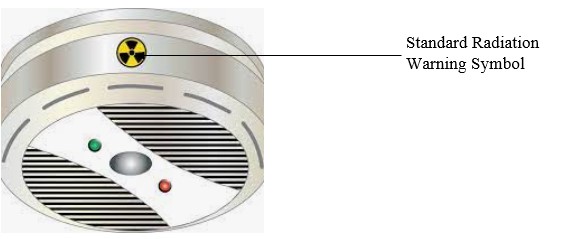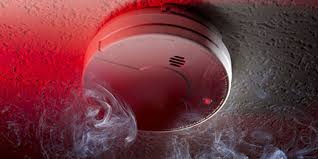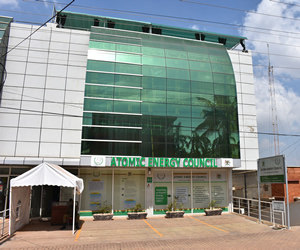A smoke detector is an electronic fire protection device that automatically alarms in the presence of smoke as a key indication of fire.
Smoke detectors are important for safeguarding buildings against fire. However, the improper disposal may pose environmental hazards including radiation related hazards for those with radioactive sources incorporated into them.
They are used as residential or commercial security devices which send a signal to a fire alarm control panel while smoke alarms issue a visual or an audible alarm locally.
They may be found in commercial buildings, households, schools and institutions of higher learning, hospitals and office buildings, among others.
Types of smoke detectors
There are six types of smoke detectors:
- Ionization smoke detector – An ionization smoke detector uses ionization of air and a consequent drop in the current to detect smoke and fire. It uses a radioisotope such as americium-241 to ionize the air particles.
- Photoelectric or optical smoke detector
A photoelectric smoke detector, also known as a light detector, is a light sensor. The components of a typical light sensor are: Optical Chamber, Cover, Case Moulding, Photodiode, and Infrared LED. Light from the LED is converted into a beam with the help of a lens. This light is then directed towards the photodiode which detects this light continuously. - Carbon Monoxide and Carbon Dioxide Detection – used to detect smoke or combustion based on the presence of carbon monoxide or carbon dioxide in the air.
- Aspirating or air sampling detector – analyzes the sample of air to detect the presence of combustion elements in the air.
- Video Smoke Detection – detects smoke based on the video feedback of the area. This detection is volume-based as opposed to point-based and is hence more effective with the use of several techniques.
- Optical Beam Detectors – smoke is detected usually based on the principle of light obscuration. The light coming from an LED is obstructed by the dense smoke which is signaled as fire detection to the alarm system and sets it off.
However, out of the six types of smoke detectors, the commonly used types are passive smoke detectors namely photo electric (optical) and ionization detectors.
Ionization detectors are distinguished from others by having a standard radiation warning symbol (black on a yellow back ground) firmly affixed to them as shown below;

Disposal of ionization smoke detectors from radiation safety perspective
A typical ionization smoke detector has a working life of 10 years. This implies that at the end of the working period it will be regarded as solid waste and should be disposed off as per the national regulations regarding disposal of solid waste. However, from the radiation safety perspective, due to the radioactive material they contain, ionization smoke detectors should not be disposed off anyhow and anywhere.
Important to note is that whereas the radiation emitted from one smoke detector is of no radiological significance, an accumulation of disused ionization smoke detectors can have some radiological significance.
Risks associated with improper disposal of ionization smoke detectors
Ionization smoke detectors are of concern because they contain radioactive material to detect smoke. Whereas the radiation emitted from smoke detectors is low, prolonged exposure can lead to the exposed person suffering long-term effects of radiation including cancer. It is a known fact that even small amounts of radiation can cause radiation health effects in case of prolonged exposure, the most observable effect is cancer.
Smoke detectors containing alpha emitting radionuclides are of no significance in regard to external exposure. However, when ingested, they are of radiological significance.
In general, the external radiation dose to the occupants during normal use of ionization smoke detectors is very small and does not pose a health risk.
The safety of the ionization smoke detectors is ensured by the small amounts of radioactive material and the secure means of its encapsulation even during a fire. However, tampering with their encapsulation especially can result into;
- The possibility of polluting the environment resulting in long-term radiation exposures.
- Unintended and unjustified exposure.
- Radiation poisoning in case the radioactive source is ingested.
Regulatory requirements for smoke detectors containing radioactive material
Pursuant to Regulation 61 of Atomic Energy Regulations, 2012 all importers/distributors of ionization smoke detectors should;
- Ensure that the activity levels in ionization smoke detectors are below the exemption levels. The exemption levels for the common radionuclides contained in smoke detectors is 1 Bq/g for Am-241 and Pu-239 and 100,000 Bq/g for Kr-85
- Ensure that legible and prominently featuring radioactive labels are visibly and firmly affixed to each consumer product and its package, stating, in the English language, that the product contains radioactive materials
- Ensure that basic information and instructions on the precautions of use and disposal of the product, written or translated in English, are made available with the product.
Advice to the public
- Importers/distributors/users may opt for other types of smoke detector technologies other than those containing radioactive material. This is to avoid accumulation of radioactive waste in the country and possible radiation exposure in case of mismanagement.
- All smoke detectors with the radiation warning symbol firmly affixed onto them should not be disposed of anywhere and anyhow. Owners of such devices should request for assistance from Atomic Energy Council.
- Improper manipulation or dismantling of ionization smoke detectors should be avoided.
- Scrap dealers should be able to identify, isolate ionization smoke detectors and inform Council for further management.
- All persons with disused ionization smoke detectors should contact Council using the below address for their proper disposal.
CONTACT ADDRESS
Atomic Energy Council, Plot 40 Bukoto Street
P.O. Box 7044, Kampala.
Tel: +256-417-101700
Emergency Toll-free line: +256-800-100-488
Email: admin@atomiccouncil.go.ug
Website: www.atomiccouncil.go.ug





